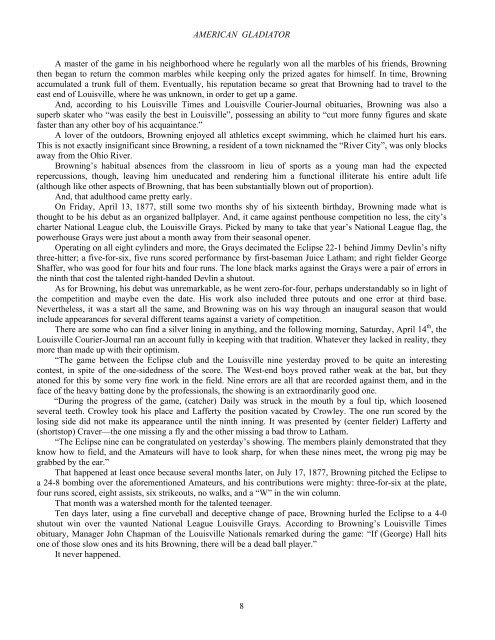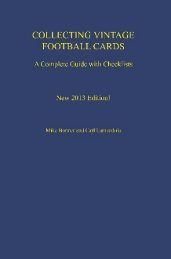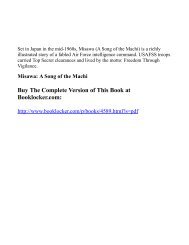AMERICAN GLADIATOR: The Life And Times Of ... - The Book Locker
AMERICAN GLADIATOR: The Life And Times Of ... - The Book Locker
AMERICAN GLADIATOR: The Life And Times Of ... - The Book Locker
You also want an ePaper? Increase the reach of your titles
YUMPU automatically turns print PDFs into web optimized ePapers that Google loves.
<strong>AMERICAN</strong> <strong>GLADIATOR</strong><br />
A master of the game in his neighborhood where he regularly won all the marbles of his friends, Browning<br />
then began to return the common marbles while keeping only the prized agates for himself. In time, Browning<br />
accumulated a trunk full of them. Eventually, his reputation became so great that Browning had to travel to the<br />
east end of Louisville, where he was unknown, in order to get up a game.<br />
<strong>And</strong>, according to his Louisville <strong>Times</strong> and Louisville Courier-Journal obituaries, Browning was also a<br />
superb skater who “was easily the best in Louisville”, possessing an ability to “cut more funny figures and skate<br />
faster than any other boy of his acquaintance.”<br />
A lover of the outdoors, Browning enjoyed all athletics except swimming, which he claimed hurt his ears.<br />
This is not exactly insignificant since Browning, a resident of a town nicknamed the “River City”, was only blocks<br />
away from the Ohio River.<br />
Browning’s habitual absences from the classroom in lieu of sports as a young man had the expected<br />
repercussions, though, leaving him uneducated and rendering him a functional illiterate his entire adult life<br />
(although like other aspects of Browning, that has been substantially blown out of proportion).<br />
<strong>And</strong>, that adulthood came pretty early.<br />
On Friday, April 13, 1877, still some two months shy of his sixteenth birthday, Browning made what is<br />
thought to be his debut as an organized ballplayer. <strong>And</strong>, it came against penthouse competition no less, the city’s<br />
charter National League club, the Louisville Grays. Picked by many to take that year’s National League flag, the<br />
powerhouse Grays were just about a month away from their seasonal opener.<br />
Operating on all eight cylinders and more, the Grays decimated the Eclipse 22-1 behind Jimmy Devlin’s nifty<br />
three-hitter; a five-for-six, five runs scored performance by first-baseman Juice Latham; and right fielder George<br />
Shaffer, who was good for four hits and four runs. <strong>The</strong> lone black marks against the Grays were a pair of errors in<br />
the ninth that cost the talented right-handed Devlin a shutout.<br />
As for Browning, his debut was unremarkable, as he went zero-for-four, perhaps understandably so in light of<br />
the competition and maybe even the date. His work also included three putouts and one error at third base.<br />
Nevertheless, it was a start all the same, and Browning was on his way through an inaugural season that would<br />
include appearances for several different teams against a variety of competition.<br />
<strong>The</strong>re are some who can find a silver lining in anything, and the following morning, Saturday, April 14 th , the<br />
Louisville Courier-Journal ran an account fully in keeping with that tradition. Whatever they lacked in reality, they<br />
more than made up with their optimism.<br />
“<strong>The</strong> game between the Eclipse club and the Louisville nine yesterday proved to be quite an interesting<br />
contest, in spite of the one-sidedness of the score. <strong>The</strong> West-end boys proved rather weak at the bat, but they<br />
atoned for this by some very fine work in the field. Nine errors are all that are recorded against them, and in the<br />
face of the heavy batting done by the professionals, the showing is an extraordinarily good one.<br />
“During the progress of the game, (catcher) Daily was struck in the mouth by a foul tip, which loosened<br />
several teeth. Crowley took his place and Lafferty the position vacated by Crowley. <strong>The</strong> one run scored by the<br />
losing side did not make its appearance until the ninth inning. It was presented by (center fielder) Lafferty and<br />
(shortstop) Craver—the one missing a fly and the other missing a bad throw to Latham.<br />
“<strong>The</strong> Eclipse nine can be congratulated on yesterday’s showing. <strong>The</strong> members plainly demonstrated that they<br />
know how to field, and the Amateurs will have to look sharp, for when these nines meet, the wrong pig may be<br />
grabbed by the ear.”<br />
That happened at least once because several months later, on July 17, 1877, Browning pitched the Eclipse to<br />
a 24-8 bombing over the aforementioned Amateurs, and his contributions were mighty: three-for-six at the plate,<br />
four runs scored, eight assists, six strikeouts, no walks, and a “W” in the win column.<br />
That month was a watershed month for the talented teenager.<br />
Ten days later, using a fine curveball and deceptive change of pace, Browning hurled the Eclipse to a 4-0<br />
shutout win over the vaunted National League Louisville Grays. According to Browning’s Louisville <strong>Times</strong><br />
obituary, Manager John Chapman of the Louisville Nationals remarked during the game: “If (George) Hall hits<br />
one of those slow ones and its hits Browning, there will be a dead ball player.”<br />
It never happened.<br />
8
















